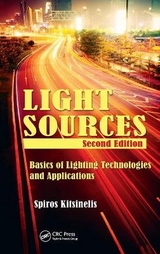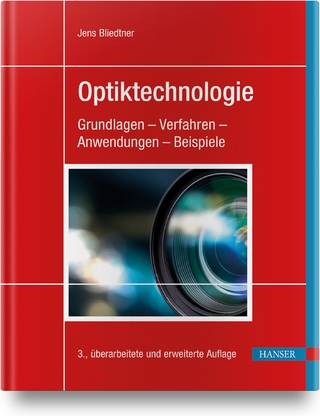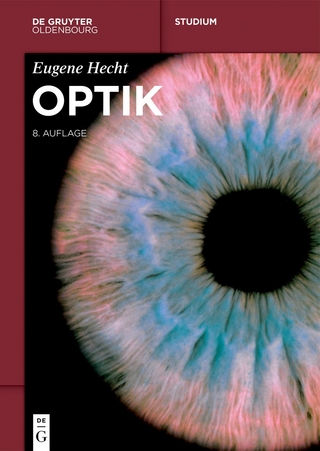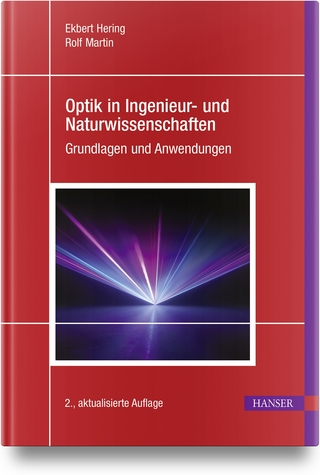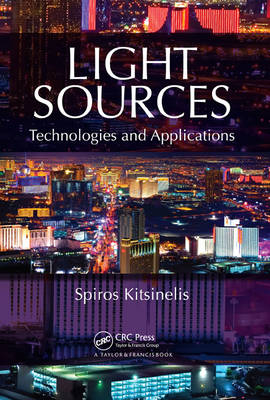
Light Sources
Taylor & Francis Inc (Verlag)
978-1-4398-2079-7 (ISBN)
- Titel erscheint in neuer Auflage
- Artikel merken
2nd edition now available: https://www.crcpress.com/9781482243673
From the dialogues of the ancient Greek philosophers right up through the physical laws of Newton, the experiments of Thomas Young and the quantum physics pioneers, the study of light was all about observing its characteristics and defining its behavior. At the end of the 19th century, wicks, wax, and oil gave way to electricity, filaments, and gases, and scientific minds began to focus on the technological creation of light, as well as its control and diverse uses. Yet, despite more than a century of profound research and development, until now, the most complete resources on lighting technology have always been compiled by and subject to the biases of commercial lighting companies.
Light Sources: Technologies and Applications answers the need of a huge and diverse range of scientists, technicians, and engineers involved in the use and development of light sources across any number of fields. Spectroscopy, architecture, lighting design, irradiation, optics, and imaging are just a few of these uses.
After delving into basic principles of light and vision, the book focuses on the three main technologies used to create light through electricity (incandescent/filament, charged gas, solid state diode) and the various families of light sources and applications born out of the three. Written by Dr. Spiros Kitsinelis, highly respected for his work on the development of novel and energy efficient light sources, the book includes data needed by researchers and technicians, as well as comparative charts and explanatory diagrams.
Dr. Kitsinelis also includes descriptions and photographs of representative products of each family of light sources. Concise and practical, while remaining both thorough and elegant, he offers a deeper analysis on the nature of light and the processes of creating it. Ultimately, he offers the depth required to satisfy pioneering research as well as applications to serve the immediate needs of everyday life.
Dr. Spiros Kitsinelis is a researcher focusing on the development of novel and energy efficient light sources. He gained his master’s and Ph.D. degrees in chemistry from the University of Sheffield in England where he concentrated on the research and development of pulse-operated low-pressure plasma light sources in the High Temperature Science Laboratories. Dr. Kitsinelis continued his research as a post-doctoral fellow at Ehime University in Japan in the department of electrical and electronic engineering. He held the position of Project Leader, at Philips Lighting Central Development Lighting, in the Netherlands, and he continued his research and development of the next generation of plasma light sources for the physics department of the National Technical University of Athens, Greece. Taking a break from research, he served as a chemical engineer for the armed forces. When he returned to civilian life, Dr. Kitsinelis picked back up on his research activities. He has acted as the National Contact Point for Energy at the National Documentation Centre of the National Research Foundation of Greece. Now recognized as a leader in his field, Dr. Kitsinelis has authored a number of scientific publications, attended many international conferences, and is the co-creator of a number of patents in the field of light sources. He is also the editor of the electronic periodical Science and Technology of Light Sources (SATeLightS). Dr. Kitsinelis
Introduction
References
Basic Principles of Light and Vision
Nature and Properties of Light
Vision
Light Source Characteristics
White Light
Measuring Light
Electrical Incandescent Light Sources
Conventional Incandescent Lamps
Halogen Incandescent Lamps
Evaluation of the Technology
Codes/Product Categorization
Electrocandolumnescence: A Novel
Light Source
General Sources
Electrical Discharge Lamps
Plasma Processes
Elastic Collisions
Inelastic Collisions
Superelastic Collisions
Low-Pressure Discharge Lamps
Low-Pressure Mercury Vapor Discharges
The Phosphors
The Electrodes
The Ballast
Low-Pressure Noble Gas Discharges
Low-Pressure Sodium Vapor Discharges
Pressure Effect
Thermal Equilibrium
Line Broadening
High-Pressure Discharge Lamps
High-Pressure Mercury Vapor Discharges
High-Pressure Sodium Vapor Discharges
Metal Halide Discharge Lamps
High-Pressure Xenon Gas Discharges
Carbon Arc Lamp
Induction Lamp s
Low-Pressure Mercury Vapor Induction Lamp
The Sulfur Lamp
Pulsed Operation
Alternative Discharge Light Sources
Microdischarge Properties for Development of Light Sources
References
Solid-State Light Sources
Light-Emitting Diode (LED )
Organic LED s
LED White Light Emissions
LED Operation
Thermal Management of LEDs
What Defines the Junction Temperature?
Overheating Avoidance
Dimming/Controlling the Brightness
General Characteristics of LEDs
Applications
Signage—Visual Contact
General Lighting—No Visual Contact with the Source
Closing Remarks
References and Useful Links
Standards
Dynamic Lighting
Luminaires
Lasers
Bibliography
Closing Remarks
Appendix A: Tables of Indicative or Maximum Values for Various Lamp Characteristics and Their Applications
Appendix B: The Different Sections of the Electromagnetic Spectrum
Appendix C
Appendix D: List of Phosphor Powders for Fluorescent Lamps
Appendix E
Appendix F
INDEX
| Erscheint lt. Verlag | 3.11.2010 |
|---|---|
| Zusatzinfo | 16-page/29 fig color insert; 36 Equations; 35 Tables, black and white; 29 Illustrations, color; 184 Illustrations, black and white |
| Verlagsort | Washington |
| Sprache | englisch |
| Maße | 156 x 235 mm |
| Gewicht | 499 g |
| Themenwelt | Naturwissenschaften ► Physik / Astronomie ► Optik |
| ISBN-10 | 1-4398-2079-1 / 1439820791 |
| ISBN-13 | 978-1-4398-2079-7 / 9781439820797 |
| Zustand | Neuware |
| Haben Sie eine Frage zum Produkt? |
aus dem Bereich
